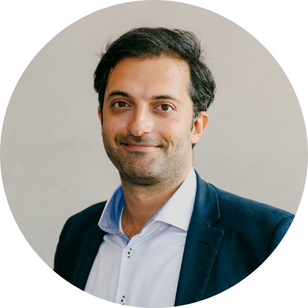Applications
 Part of the Oxford Instruments Group
Part of the Oxford Instruments Group
Expand
Collapse
Oxford Instruments is delighted to announce that Professor Angelo Di Bernardo and Dr Alexander Grimm as the joint winners of the 2022 Nicholas Kurti Science Prize.
The Award recognises Angelo Di Bernardo’s achievements in the spectroscopy of spin-polarised (spin-triplet) states in superconductor/ferromagnet hybrids and for the discovery of new coupling effects and quantum phases existing at the surfaces and interfaces of strongly-correlated electron materials and materials with low dimensionality.

“I feel honoured for having been awarded this prestigious prize, since the Nicholas Kurti prize acknowledges the importance of the research work that I have been carrying out with great dedication and passion throughout my academic career."
Alexander Grimm earned his place as an Award winner for his work on non-linear effects in Josephson junctions for quantum information processing, involving:
i) the experimental demonstration of anti bunching statistics in the photons emitted by inelastic Cooper-pair tunnelling through a voltage-biassed Josephson junction
ii) The creation of a novel autonomously stabilised qubit in a two-photon driven Kerr-nonlinear superconducting resonator.

"It is of course a great honour to receive this prize, in particular because it further emphasises the growing importance of quantum microwave emission through inelastic Cooper pair tunnelling (sometimes called Josephson photonics) and of bosonic quantum error correction.”
The Nicholas Kurti Science Prize promotes and recognises the novel work of young scientists working in the fields of low temperatures and/or high magnetic fields in Europe.
The winner will be formally presented with the Nicholas Kurti Science Prize trophy at an upcoming European conference, where they will present their award-winning research work.
The Nicholas Kurti Science Prize selection committee was very pleased to recognise the winners' research works. The committee consists of leading European physicists, chaired by Professor George Pickett, Lancaster University, UK.
The objective of the Nicholas Kurti Science Prize is to promote and recognise the novel work of young scientists working in the fields of low temperatures and high magnetic fields within Europe. Oxford Instruments is aware that there is a critical and often difficult stage for many such researchers between completing their PhD and gaining a permanent research position. The company has therefore been helping individuals who are producing innovative work by offering assistance both financially and through promotion of their research work, through sponsoring the Nicholas Kurti Science Prize for 15 years, together with other such prizes for research in physical science in the Americas, Japan, China and India. The Nicholas Kurti Science Prize is named in honour of the late Professor Nicholas Kurti (1908-1998). Professor Kurti is known for his distinguished work in ultra-low temperature physics at the Clarendon Laboratory, University of Oxford, UK which during his career earned the name “the coldest spot on earth” as a consequence of the ground-breaking research conducted there; using adiabatic demagnetisation Professor Kurti was able to create temperatures of a millionth of a degree above absolute zero.
The previous winners of the Nicholas Kurti Science Prize are Professor Dr Alexander Ako Khajetoorians, Dr Lapo Bogani, Professor Ronald Hanson, Professor Mathias Kläui, Professor Dr Christian Rüegg, Professor John Morton, Professor Lieven Vandersypen, Professor Kostya Novoselov, Professor Andreas Wallraff, Dr Silvano De Franceschi, Dr Isabel Guillamón, Dr Andrea Caviglia, Dr Francois Permentier and Dr Erwan Bocquillon, Dr Philip Moll and Dr Menno Veldhorst.